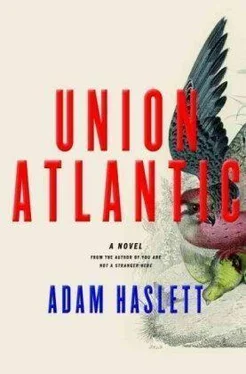“I guess Emily probably told you that I asked about you. She’s not a big one for secrets.”
“That’s for sure.”
He wondered if he had appeared to Doug as Alex did to him now: bold and terrified at the same time.
“It’s okay,” Nate said. “It’s cool.”
“We don’t have to do anything if you don’t want to. I wasn’t angling for that. You just seem like a sweet guy. And I think you’re kind of cute, too.”
Nate examined the spines of the novels on the bookcase, amazed his legs were still capable of trembling after all he’d drunk.
“Thanks,” he said, taking another swig. Queer, he thought. Coward. Predator. Weakling. Monster. Only he couldn’t tell to whom the words were directed, Alex or himself. All he knew was that the derision moved in his blood like venom.
Just then he heard the music as if for the first time. As if his ears had been plugged and now the stoppers had come loose. The singer’s words were hard to make out beneath the wash of sound, but the plaintive tone was unmistakable, calling out through the dark orchestral swirl, the voice promising nothing but itself, no reassurance or escape, no comfort or caress, just testament to a longing that mere touch would never satisfy, the resonance of it reaching so much deeper into the past than touch ever could and so much farther into the future, calling the aching spirit from its hiding place, at least for a moment. And Nate saw then, in his mind’s eye, the form of his father’s corpse laid out on the floor in front of him, his garroted head resting to one side, his neck bruised from ear to ear, the poor, dear man. And lying there beside him, Ms. Graves, in her flannel skirt and cardigan, her gray hair brushed down over her ears and her eyes closed, the two of them hovering in the netherworld between the living and the forgotten dead.
“Can I ask you a question?”
“Sure,” Alex said.
“Is it okay if we kiss?”
Alex nodded, and Nate stood, stepping through the shadows at his feet to cross the space between them.
At night, from his hotel balcony, Doug watched the Jaguars and Porsches cruise up and down Arabian Gulf Road blaring pop music as they glided by the armored cars that had appeared recently at intersections all over Kuwait City. According to the concierge, the American schools had announced an unscheduled six-week vacation and the ex-pats not here for the war were leaving with their children by the hundreds. But in the evenings along the promenade the Kuwaiti families still picnicked on the grass, enjoying the mild winter air and the views of the glittering towers up and down the waterfront, leaving their trash on the ground behind them for the municipal workers to collect — the Filipinos and Pakistanis, who came by in their minivans and green jumpsuits to spear the crumpled plastic bags and date wrappers and empty soda cans tipping and rolling in the breeze.
When he couldn’t sleep Doug walked the city, whose citizens seemed to stay up all night shopping in the twenty-four-hour supermarkets. There were American sailors about as well, up from the naval base for their sober nights out on the town. He did his best to avoid them, though he knew his chances of being detected here were small. He’d been careful, at first, sounding out other guests at the hotel about which contractors might be hiring, thinking he needed to avoid the firms working directly with the State Department. But soon he’d realized how far the demand for people outstripped the supply and just how many of the men here were themselves not so interested in anyone knowing much about their past. If you were an American and a firm wanted you, the background check was often skipped lest it prove inconvenient.
Passing through the streets of low-rise apartments he’d reach Al Taawun Street from where he could see over the resorts and the private compounds to the coast, the lights of skiffs and police boats mingling with the more distant signals of tankers headed south with their American escorts for the Strait of Hormuz.
In all his life he’d never had this much time on his hands; such idleness was a menace to him. In the hotel room, he felt caged but out walking there was nothing to do but think. Seeing the young sailors in their dress whites moving in packs along the sidewalks put him in mind of when he’d left for the navy and what he’d imagined lay ahead of him back then.
He’d ridden the commuter train into Boston with his suitcase and knapsack and crossing the dingy concourse of South Station boarded a Greyhound that had taken the better part of two days to carry him up to the Naval Station Great Lakes, there along the western shore of Lake Michigan.
Through the dead of night on that trip, as the other passengers dozed, Doug had put on his Walkman and watched the fencing alongside the highway tick by in the headlights, the flat expanses of Ohio and then Indiana stretching out in every direction, the farmland parceled into one forty-acre field after another, as dark and empty a landscape as his Eastern eyes had ever seen. With the signs for Gary and Chicago, lights appeared and soon the streets were bright with lamps above the barren parking lots and block-long warehouses. As the bus bounded over paved gorges of underpasses and empty surface roads, a panorama that made the Alden strip seem like little more than a candle’s light came into view: acre after acre of oil tanks and cylinders connected by masses of strut work and pipes running this way and that, white smoke jetting from valves up and down the tangle of steel, lit by thousands of naked yellow bulbs lining ladders and catwalks and above this vast tract of works, a giant orange flame billowing from the tip of a steel column like some temple fire undulating against the pale-yellow sky.
Before that trip, he’d never slept more than a single night away from home. He had signed up for the navy without ever having set foot on a boat. His first day out on a training vessel he kept thinking of the movie he’d seen on television as a kid about the sinking of the Bismarck and how when a ship was attacked and started taking on water, the sailors’ orders were to seal off the flooding compartments along with the men trapped inside them. When the whitecaps came up on the lake and the boat began rocking, he grew so nervous he thought he’d be sick. But then the boy next to him threw up. Doug watched with fascination the disdain in the eyes of the training officer as he handed the kid a brush and pail and told him to scrub. Gripping the rails, the others had looked on as their fellow recruit got down on his hands and knees, reaching for the streaks of his own vomit running over the deck.
He’d seen then that fear was a question of balance. As long as he saw more of it in the faces of those around him than he himself displayed — that is, as long as he had confidence — he would do more than survive. He would gain. Or so he’d imagined.
Kuwaiti civilians were no longer being allowed into the northern part of the country. Only the farmers and their foreign laborers were permitted to remain. The highway leading up to the border was said to be clogged with American convoys. It wouldn’t be long now, people agreed. During the day the government ran drills for possible Scud attacks and at the hotel restaurant in the evenings there were stories of UN staff departing and civilian contractors moving onto the American bases for protection.
Finally, Doug got the call from his new employer informing him of the date for his team’s departure. That night, he dreamt he was in the back row at St. Mary’s in Alden, listening to Father Griffin deliver his sermon, the congregation fixed in their seats and silent. All except his mother who sat in the front pew beside Nate. She leaned over to whisper words in the boy’s ear and Nate nodded in agreement. Then, as the sermon continued, the two of them stood and walked back down the aisle together passing Doug without so much as a glance. Right past him and out the doors of the church. Father Griffin kept speaking and the people kept listening and no one appeared to take any notice.
Читать дальше












